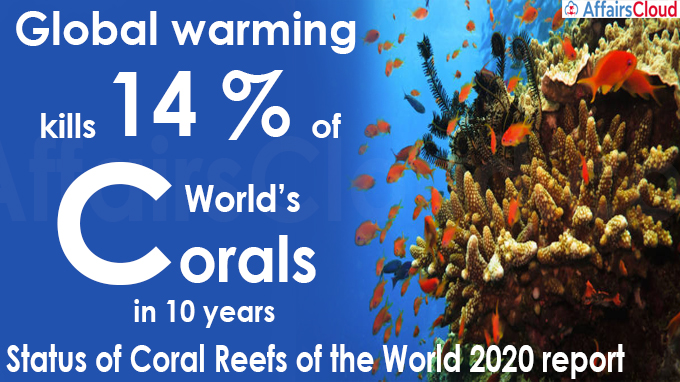 In accordance with the 6th edition of ‘Status of Coral Reefs of the World: 2020’ report by the Global Coral Reef Monitoring Network (GCRMN) there is a loss of 14% of the world’s coral from 2009 to 2018. The loss is varied by region, ranging from 5% in East Asia to 95% in the eastern tropical Pacific.
In accordance with the 6th edition of ‘Status of Coral Reefs of the World: 2020’ report by the Global Coral Reef Monitoring Network (GCRMN) there is a loss of 14% of the world’s coral from 2009 to 2018. The loss is varied by region, ranging from 5% in East Asia to 95% in the eastern tropical Pacific.
- The report provided the most detailed scientific picture to date of the elevated temperatures affecting the world’s reefs.
- The United Nations Environment Programme (UNEP) provided financial, technical and communication support to the report.
Basis of Analysis:
This is the largest analysis about global coral reef on the following coverage:
- spanning 40 years
- in 73 countries
- across 12,000 sites
- collected by more than 300 scientists
- through 2 million individual observations
Reason behind the degradation of coral reefs:
Global warming and other local pressures such as overfishing, unsustainable coastal development and declining water quality.
- Elevated sea surface temperatures (SSTs) are the main driver of coral loss.
Key Points:
i.Coral Reefs cover only 0.2% of the ocean.
ii.It provides home to at least a quarter of all marine species, providing critical habitat and a fundamental source of protein, as well as life-saving medicines.
iii.Hundreds of millions of people around the world depend on them for food, jobs and protection from storms and erosion.
- The value of goods and services from coral reefs is about $2.7 trillion per year, including $36 billion in tourism.
iv.Oceans absorb more than 90% of the excess heat from greenhouse gas emissions, shielding land surfaces but generating huge, long-lasting marine heatwaves adversely affecting species of corals.
Recent Related News:
The World Meteorological Organization (WMO) released a report on the latest climate science information named ‘United in Science 2021’. As per the report, the COVID-19 caused only a temporary decline in carbon dioxide (CO2) emissions in 2020. Whereas the concentrations of major greenhouse gases – CO2, methane (CH4) and nitrous oxide (N2O) in the atmosphere continued to increase in 2020 and the first half of 2021.
About UNEP(United Nations Environment Programme)
Executive Director– Inger Andersen
Headquarters– Nairobi, Kenya




